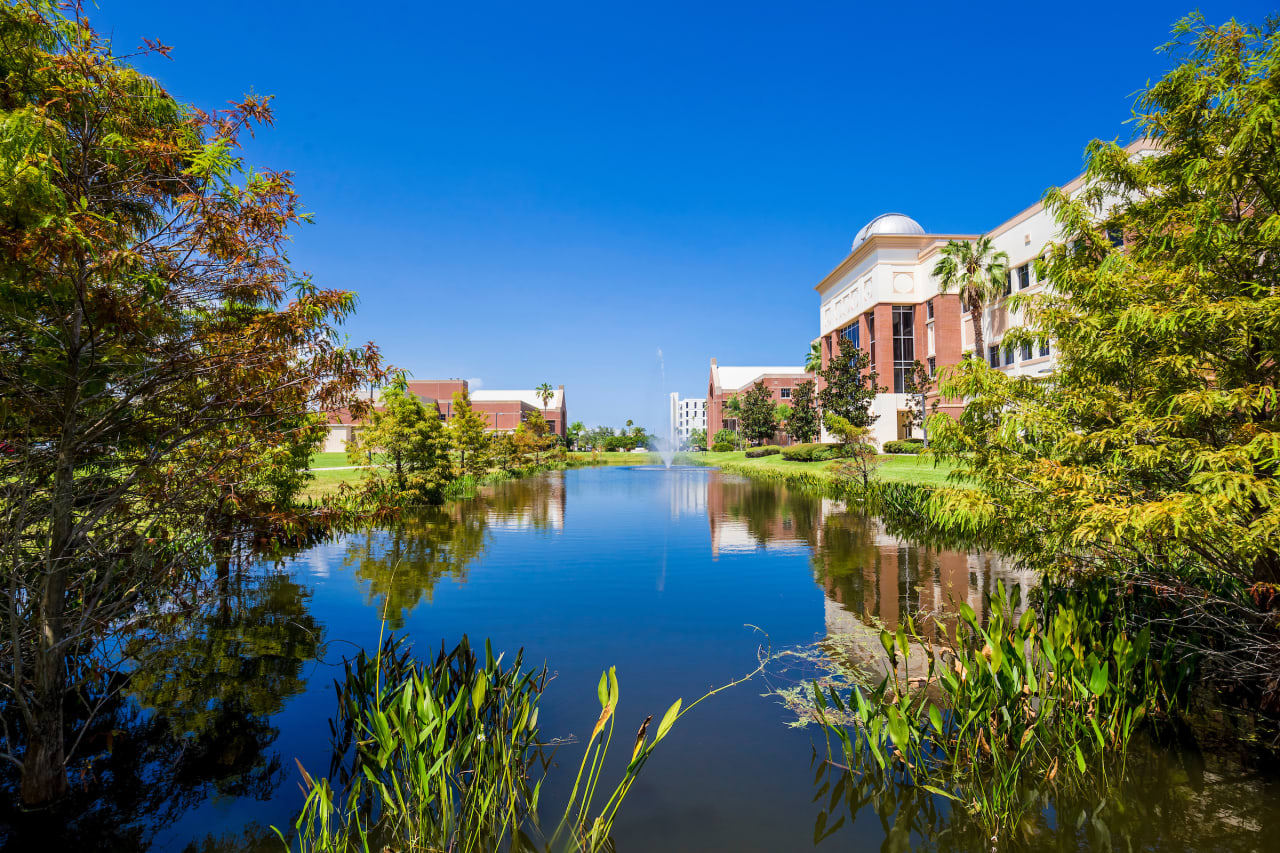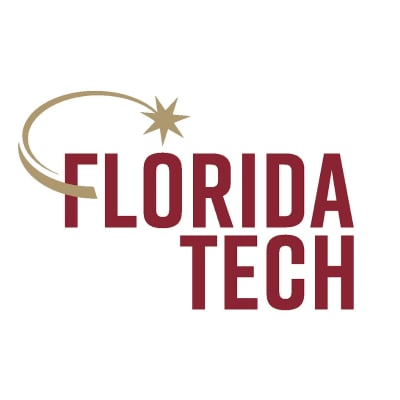
BS in Biochemistry
Florida Institute of Technology

Key Information
Campus location
Melbourne, USA
Languages
English
Study format
On-Campus
Duration
4 years
Pace
Full time
Tuition fees
USD 21,173 / per semester
Application deadline
Request info
Earliest start date
Sep 2024
Introduction
What is a Biochemistry Degree?
Whether you want to explore the mysteries of DNA, aid in the development of innovative biotechnologies, or study the diagnosis and treatment of disease, you can reach toward your career goals with a biochemistry degree from Florida Tech. Here you'll develop a strong background in biology and chemistry and get hands-on experience in analysis and instrumentation.
Biochemistry careers are built on a solid foundation of understanding complex chemical reactions that occur inside each living organism. Also known as the chemistry of life, the study of biochemistry connects the living world to the chemical world to study the processes that occur in plants, animals, and single-celled organisms. Biochemistry is responsible for most of the advances in medical research, agriculture, and genetic engineering, all of which is generally accomplished by tying together new medical technologies and discoveries in both genetic and cell biology. When new or transformational discoveries are unveiled, it is likely that a biochemist is part of the team. With a biochemistry degree, this could be you.
Earn an Advanced Degree
After receiving their biochemistry degree, many of our graduates go on to master's and doctoral programs at Florida Tech or other prestigious universities, including the University of Florida, the University of South Alabama, Columbia University, Princeton University, and the University of Texas.
Why Pursue a Biochemistry Degree at Florida Tech?
Perhaps the greatest benefit of studying biochemistry at Florida Tech is being part of two outstanding science departments—Biology and Chemistry—both of which are committed to a high level of faculty-student interaction and collaboration.
We have strong ties to the Kennedy Space Center and the Harbor Branch Oceanographic Institute, which means more opportunities for students. In addition, nearby natural resources such as the estuarine habitats of the Indian River Lagoon and the Atlantic Ocean marine ecosystem are ideal for biological research, making Florida Tech one of the country's most attractive biochemistry colleges.
Small Class Sizes and an Internationally Recognized Faculty
Small class sizes with a student-to-faculty ratio of 12:1 give you an opportunity to receive one-on-one attention from professors. Florida Tech's active faculty are involved in research and teaching. The Ph.D. faculty teaches all the classes—no graduate-student teachers. In addition, students learn from world-renowned chemists in an environment that encourages undergraduate participation in research projects.
Undergraduate students usually find a home in a research group early in their career, which may result in scientific journal publications and research exchanges with other biochemistry colleges. In fact, 75% of chemistry graduates have published a paper in a scientific journal by the time they graduate. Together, the faculty has secured $3 million in external funding for the department, as well as another $2 million to support research instrumentation.
Location, Location, Location
Florida Tech is the perfect place for a Biochemistry degree. The 130-acre campus is located on the Space Coast (so named because of the presence of NASA and the Kennedy Space Center on Cape Canaveral just north of us). The area has the fifth-largest high-tech workforce in the country, with more than 5,000 high-tech corporations and government and military organizations located nearby. This workforce also provides a variety of internship and employment opportunities.
Florida Tech is just minutes from the Atlantic Ocean, the Indian River Lagoon, the most diverse estuary in North America, 72 miles of beautiful beaches, and a short trip to the Florida Keys or the Orlando theme parks. We also have a rich campus life that includes a wide range of intramural and collegiate sports, clubs, and social activities.
Build Lasting Professional Relationships through Campus Organizations
Florida Tech’s student chapter of the American Chemical Society (ACS) is a highly active group of students from all disciplines who enjoy learning about and sharing an interest in chemistry. ACS regularly holds campus-wide events to inspire an interest in chemistry, including ice cream socials and silver bottling events. This is also a great way to network and learn about other possible opportunities and biochemistry internships.
Beyond the classroom, biochemistry majors build leadership and professional experience through exciting internships (see below) and participation in academic organizations like Beta Beta Beta (TriBeta, the biological sciences honor society), the Premed Club, student government, and over 100 other student organizations.
Biochemistry majors also participate in exciting summer fieldwork programs that take them to Costa Rica, Peru, the Caribbean, Australia, the Appalachians and the Rocky Mountains, and the African savannah.
Admissions
Curriculum
Gain Practical Experience
Biochemistry degree students are immersed in "real science," not just book learning. As you get to know your professors and work among your peers in small classes and department gatherings, you'll soon find an opportunity to join a research group. Courses like Biological Discovery and Introduction to Biochemistry are among the classes taken in your first year. Guided by highly qualified faculty who care about your success, you'll hone your strengths and begin specializing as early as your second year.
As seniors, students refine their practical skills in technical electives and specialized labs. They also can undertake exciting collaborative research with a peer or professor or work independently on a topic of their choosing. All undergraduate biochemistry students present papers at academic meetings and conferences. As a result, they get practical experience, an enhanced job search portfolio, and the perfect preparation for employment or graduate school.
Curriculum
Biochemists, in studying all kinds of living organisms including viruses, bacteria, fungi, plants, and animals (including humans), have found that many of the fundamental biochemical properties of living systems are shared throughout the hierarchy of life forms. Because biochemists try to unravel the complex chemical reactions that occur in such a wide variety of life forms, biochemistry provides the basis for practical advances in medicine, veterinary medicine, agriculture, and biotechnology. Biochemistry underlies and includes such exciting fields as molecular biology and bioengineering. As the broadest of the basic sciences, biochemistry includes many subspecialties, such as inorganic biochemistry, bioorganic chemistry, physical biochemistry, biochemical and molecular genetics, biomedical pharmacology, and immunochemistry. Recent advances in many areas of biochemistry have created links among technology, chemical engineering, and biochemistry. More than ever, this is the age of biochemistry because the techniques of so many different disciplines can now be applied to studying the chemistry of living systems.
Career opportunities for biochemistry majors are rapidly expanding in the areas of agricultural research, biotechnology firms, governmental laboratories, industrial research, and development and research institutes, as well as university research and teaching. Far-reaching advances in many areas of basic and applied research are projected over the next few years. These areas include plant genetics; the biochemistry of cell receptors for hormones and neurotransmitters; the diagnosis and treatment of disease, particularly inherited diseases; and toxicology. All require an understanding of biochemistry and the use of biochemical techniques.
The course of study leading to a Bachelor of Science in Biochemistry is an interdisciplinary program administered by the Department of Biomedical and Chemical Engineering and Sciences. The curriculum has flexibility in that technical electives can be selected to provide a strong emphasis on either biology or chemistry, and prepare the biochemistry major for a variety of careers. All students take a core curriculum of basic science and mathematics during the first two years. During the junior and senior years, students take many specialized courses that reflect their choice of emphasis between biology and chemistry.
Students should indicate their desired emphasis by the beginning of the second semester of the sophomore year, at which time a faculty advisor in the department may be assigned. A student’s request for a change of advisers will be honored at any time during the program.
Senior Thesis
The biochemistry curriculum allows for significant undergraduate research experience, culminating in a senior thesis for those students who wish to pursue postgraduate studies and are maintaining a grade point average of 3.0 or better in all science and mathematics courses. A qualified student wishing to participate in the senior thesis program must notify the department no later than the end of the fall semester of the junior year. A thesis committee, consisting of one or more faculty members from the department, will be formed to consider the thesis proposal, which must be submitted during the spring semester of the junior year. After the approval of the senior thesis committee and the appropriate department head, based on both the proposal and the student’s academic record, the student will be permitted to register for BCM 4991 Senior Thesis in Biochemistry 1 and BCM 4992 Senior Thesis in Biochemistry 2 during the senior year. These courses and COM 2012 Research Sources and Systems substitute for CHM 4800 Undergraduate Research 1 and four credit hours of restricted chemistry electives toward meeting the degree requirements listed below. Senior Thesis in Biochemistry students is encouraged to include at least one year of foreign language (French or German) in their degree programs.
Career Opportunities
Career Outlook
Florida Tech Biochemistry grads are routinely hired immediately after graduation by the organizations listed above that offer internships to students. Other students have been hired by such organizations as:
- Baltimore Aquarium
- Brevard County Environmentally Endangered Lands Program
- Brevard Zoo
- Sea World Florida
Biochemistry careers are found in private and non-profit organizations, government agencies, and research institutions. Undergraduates getting their biochemistry degree often participate in research endeavors, internships, and cooperative learning.
Facilities
English Language Requirements
Certify your English proficiency with the Duolingo English Test! The DET is a convenient, fast, and affordable online English test accepted by over 4,000 universities (like this one) around the world.